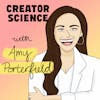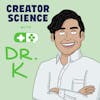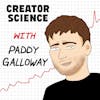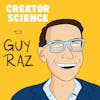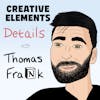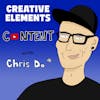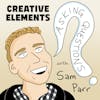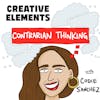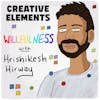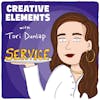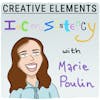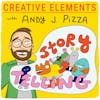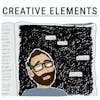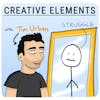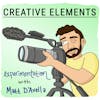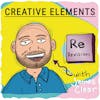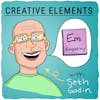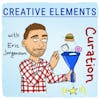
#25: Eric Jorgenson – Creating a full-length book from Tweets, interviews, essays, and podcasts
Play EpisodeEric Jorgenson is the author of The Almanack of Naval Ravikant: A Guide to Wealth and Happiness (also called Navalmanack).
Eric Jorgenson is the author of The Almanack of Naval Ravikant: A Guide to Wealth and Happiness (also called Navalmanack). The Almanack is a collection of insight from Naval Ravikant that Eric curated from from Twitter, Podcasts, and Essays over the past decade. In this episode we talk about Eric’s process of creating the book, how he created his own constraints, how he managed to make progress while doing this as a side project, and why he believes Curation opens the door for more books like this.
Transcript and show notes can be found here.
***
LISTENER SUPPORT
Join our community on Facebook
Support this show through Buy Me A Coffee.
***
SPONSORS
Try Podia and save 15% for life as a Creative Elements listener
Start your free trial of SavvyCal and get your first month free using promo code ELEMENTS
ABOUT JAY CLOUSE
Subscribe to my weekly newsletter
Enroll in my course on podcasting, Podcast Like The Pros
***
PODGLOMERATE NETWORK
This show is a part of the Podglomerate network, a company that produces, distributes, and monetizes podcasts. We encourage you to visit the website and sign up for our newsletter for more information about our shows, launches, and events. For more information on how The Podglomerate treats data, please see our Privacy Policy.
Since you're listening to Creative Elements, we'd like to suggest you also try other Podglomerate shows surrounding entrepreneurship, business, and careers like Rocketship.fm and Freelance to Founder.
Learn more about your ad choices. Visit megaphone.fm/adchoices
Eric Jorgenson 0:00
I want this to be the most highlight dense book in the Kindle Store. And the test for this is like, can you open? Can you flip the book open to any page and read any paragraph and feel like you can just kind of sit with that and think interesting thoughts.
Jay Clouse 0:16
Welcome to Creative Elements, a show where we talk to your favorite creators and learn what it takes to make a living from your art and creativity. I'm your host, Jay Clouse. Let's start the show.
Jay Clouse 0:42
Hello, my friend. Welcome to another episode of Creative Elements. We have a little bit of a different episode today that I'm really excited about. Most weeks on this show, I'm talking with very established creators who have been earning a living from their art and creativity for years already. But today I'm speaking with someone who is in the midst of publishing his biggest creative project to date. In fact, this project is launching the day of this release September 15, 2020. That's today. If you're listening to this in real time, of course, his name is Eric Jorgenson. And he's a product strategist at a startup called Zaarly. But he's also been writing over the years on his blog called Evergreen, where he's written in depth about topics including product market fit, network effects, value creation and flywheel effects. Today though, he's releasing his first full length book, but it's not like any book that I've ever read before.
Eric Jorgenson 1:35
I guess I don't think of myself as an author, because I'm not I haven't written this book, I've kind of created it. You know, the raw materials. We're all existing podcasts or transcripts, or interviews or tweets from Naval. And so I feel a little bit like an imposter saying, I'm writing a book, but I don't know what other verb to use, because everyone expects books to be written.
Jay Clouse 1:56
The book is called The Almanack of Naval Ravikant, a guide to wealth and happiness, or Navalmanack for short. It's a collection of insight fromNaval Ravikant that Eric curated from Twitter, podcasts and essays over the past decade. In that word curate is what makes the Navalmanack special. But before we go any further, you may be wondering who Naval Ravikant is. Naval is the founder of AngelList. He also founded Epinions and Vast.com. He's an angel investor in Twitter, Uber, Yammer and more than 100 other companies. He's become widely followed for his thoughts on startups investing crypto wealth and happiness. in some circles, Naval has almost a mythical reputation as the angel philosopher to use the words of Shane Parrish of Farnam Street and his perspective on Twitter especially has gotten a lot of attention, including Eric's and Twitter is where this whole project began.
Eric Jorgenson 2:50
This idea came about a few years ago and I created like a very kind of half assed tweet based on upon which is the Book of Navaledge. It's like if I wrote the book of Navaledge curating you know, some of Naval's, you know, favorite isms or whatever into a book and created it. Would it be worth, you know, I was thinking a tiny book, you know, like a PDF or a big blog post or something like that is that interesting to people and just kind of tweeted at one night and went to bed and woke up and Naval had retweeted it, and 5,000 people said, yes, oh, my God, please, I want this. And Naval said, I'm happy to support it, you know, provide any materials you want, whatever. So I was like, Well, I guess I have to do this project. Here we go.
Jay Clouse 3:29
According to the books website at Navalmanack.com, Eric distilled more than 17,000 tweets, dozens of interviews and several podcasts and essays over the last 10 years to create this book, which emphasizes two main themes, wealth, and happiness.
Eric Jorgenson 3:46
The first piece is wealth. And it's not a step by step guide so much as a look at the principles of how wealth is built. So it has ideas like leverage funding leverage to capital through employees through products like podcast and the written word seeking accountability, you know, finding ways to put your own reputation at risk, so that you capture the upside of that. Those are some of the wealth principles. On the happiness side, it kind of starts with the realization that happiness is a skill, and a choice and something that you can develop over time, through, through habits and through kind of retraining. The final piece of the book is a little bit of an overview of how to apply all these things. And some of the recommended reading Naval recommended a ton of books over the years. And you'll see a lot of the roots of the ideas that he talks about in these books. And so if you want to go further into his ideas, or seek some of the inspiration that he found, you can find it through you know, some of his recommended reading on spirituality or science or some of the fiction even, you know, science fiction was a huge influence on him.
Jay Clouse 4:53
I wanted to talk to Eric about this process while it's still fresh in his mind. So in this episode, we talk about Eric's process of curating a book, how he created his own constraints, how he managed to make progress while doing this as a side project, and why he believes curation opens the door for more books like this. If you enjoy this interview, the almanack is available online for free at navalmanack.com. links to that will be shared in our private Creative Elements listeners group on Facebook. I'd love to hear your thoughts on this episode. As you listen, I'd love to hear your thoughts on this format of talking to someone who's in the midst of creating something right now. You can find me on Twitter or Instagram @JayClouse. But now, let's hear from Eric.
Eric Jorgenson 5:37
I'm, frankly stunned that he was like, Yeah, go for it kid. And I don't know what sort of research he did to kind of bolster his confidence. But I was I tried to be quite communicative with him as progress was made, you know, every quarter. So I'd be like, Hey, here's where I'm at. We're making progress on this in this scale. And he was always helpful and responsive. He had some conditions for participation, which I think were totally, totally valid, he's like, I want to make it very clear that this is not me. I'm not the author of it. I'm not making any money off of it. I'm, you know, this is you doing you, but I'm happy to help kind of further the spread of his ideas and his work. So it was kind of an interesting thing, because this is such a novel type of project, but I'm really grateful for, you know, the energy and the helpfulness and the time that he he gave it.
Jay Clouse 6:26
When did Navaledge become Navalmanack?
Eric Jorgenson 6:29
Pretty quickly. There were there were a number of replies to that initial tweet. They were like, I think verbatim someone said please do this, but with a different name. like okay, but I'm not giving a pun like, but Poor Charlie's Almanack is one of my favorite books of all time. And and that came from, you know, Benjamin Franklin's like Poor Richard's Almanack. So there's kind of this like rich history of almanacks that are some of my very favorite books that are actually curations of you know, all of Charlie Mungers talks. And so I really liked this theme. And I just read principles by Ray Dalio and I had, you know, in it, he says like, I wish other people would write their versions of this book near the end of their career, how did they make decisions? What drove them? What was important to them? How did they run the organizations, I was like, I wish that too. There's a lot of people that I wish had written their version. And I kind of looked around and realized that the raw material was out there. But there's a ton of work and not everybody was going to do that. I think Naval is one of those people who's kind of had a really unique career and has a unique perspective on a lot of things. And the raw material was there to create his version of principles, this this kind of Almanack, and if he was willing to kind of let me take a shot at it, I thought that that would be a pretty remarkable artifact to create.
Jay Clouse 7:38
You've mentioned Poor Charlie's Almanack a couple of times. Can you give us a little bit of background on that book? Because it sounds like it was pretty important in your writing of this book.
Eric Jorgenson 7:48
Yeah, unfortunately, all that was important in my life. I mean, I picked it up off my dad's bookshelf at 21. And it I think, completely changed who I am because it changed everything that I read for five years. After I picked it up, but Charlie Munger is is Warren Buffett's kind of right hand man, the Vice Chairman or whatever, of Berkshire Hathaway. And he's a brilliant investor. And he's kind of this genius curmudgeonly old polymath who pulls no punches on anything and is not afraid to easy's read, you know, widely across every discipline. He's got opinions on everything from architecture to energy independence. And I just find him completely fascinating. Poor Charlie's Almanack is, is about half biography and half a compilation of the speeches that he's given the most of the wisdom that is shared by Charlie comes from, you know, he's done a commencement speech at USC. He's done some talks at U of M. in there's a lot in these, you know, every few years, he would do like one big talk, the psychology of human misjudgment was something that he had studied for 20 years and then just one day decided to kind of share this 90 minute talk that is incredibly brilliant and wide ranging and is just like, here's all the ways that your brain is tricking you. kind of built on that the work from Robert Cialdini and almost before some of the stuff that economist has done is a really kind of accessible way to start in that world. But it's brilliant lessons on investing and character. And you know, it's almost stoic, like, if you've read some stoicism, you hear that in there, he's staunchly against self pity and all forms. But it's a brilliant book. It's enormous. So it's a coffee table book. And it's $60. And it's inconvenient to buy and read, and, but it is absolutely worth it. And that was compiled by his friend, Peter Kaufman. So another kind of in this tradition of books that were curated more than they were written.
Jay Clouse 9:38
Talk about these raw materials and what you believed the amount of material to be and what ultimately was the amount of material because you know, you're on Twitter and you see a tweet from Naval. And it's, you know, 140 characters at the time now 280 characters and you probably think there's not this, this can be done, but what is that what that volume of workload look like.
Eric Jorgenson 10:00
Yeah, when I started, there was a few kind of really well known podcasts. You know, he had just done the the knowledge project interview with Shane Parrish, which was incredible. He had a few with Tim Ferriss that are fantastic from from earlier on. And then of course, you know, 10 years of Twitter history. And as I dug in, I found there's dozens and dozens of interviews, of course, you know, he did some exceptional stuff with Sarah Lacy early on and Pando and he continued to do the Joe Rogan interview came when I was probably halfway through the book. It's like, okay, we're gonna do a lot of refiguring around this one. I think all in there was almost 100 sources, individual sources, and well over a million words of transcription.
Jay Clouse 10:38
And sources being like Twitter is one source, podcast interviews are each one source, written interviews and articles are one source. A 100 sources.
Eric Jorgenson 10:49
Yeah, pretty close. I think the final list is in the 80s or 90s. And you know, the Twitter line is one sources of 20,000 tweets. And so that is actually where I started. I just dumped all that tweets into a spreadsheet. And did one pass to yes or no another pass of categorization and other past categorization just over and over distilling and filtering and curating and trying to kind of organize these thoughts into something cohesive. And then kind of following in with some of the meteor pieces, the interviews and the posts that he'd done, and finding out places that he had explored those ideas in more depth, so that I can kind of build out the the meat around the skeleton. One of the things I learned in this process is that it's really difficult to learn ahead of encountering the obstacle. So it is really there was a time when I kind of was like, I need to learn all of this before I start, and that was, frankly a waste of time because when you are at the obstacle kind of either help emerges or the answer emerges or something will kind of you will go learn what you need to clear the obstacle, but it's really hard to know until you get there. And with the book format itself. It wasn't too hard. I mean, I basically made it giant Google Doc, that was like my idea of what would fit into a book. And then I actually worked with Scribe who helps you kind of show up with a Google Doc, and you're like ragged from this giant, long creative process you've been on. And they kind of take you in and say, Don't worry, we've got it from here. We're experts in books. We're experts in design and pays lab and proofreading and publishing. And we will take this creative thing that you've done and make sure that it makes an excellent book and kind of show you all of this stuff that you need along the way.
Jay Clouse 12:29
With all of those sources, all of those words, I could see how this could very easily be a very large book, How big is the book? Now after it's been completely curated?
Eric Jorgenson 12:41
Yeah, the published book will be just under 50,000 words, about 45,000. That's probably going to be a few hundred pages. I had the first version of the finished manuscript was more than 100,000 words. And it was it was very comprehensive and it went deep into some of the more arcane areas that like I'm super interested in like part of the reason this was such a fun project for me is I'm interested in all this stuff and of all talks about, I'm interested in crypto and education and managing startups and angel investing and all of it. And I built this this kind of first giant manuscript that was very like Poor Charlie's Almanack, it was like, everything is categorized, everything was thorough. And I gave it to, you know, a few dozen kind of peer readers and friends, you know, everywhere from my parents all the way down to, you know, friends in college, who would be kind of, I think, less patient with with some of the stuff that they were not interested in. And basically, everyone like, petered out somewhere along the way, or kind of jumped around to sections that interested them. And what ended up making the final cut into the book was the stuff that everyone was interested in, and everyone was glad that they were. That was a really hard decision for me until I realized I can publish everything on the website and it could be a really kind of interesting second act for people who love the book and wanted to dive deeper to kind of pick their things from there, you didn't have to publish this enormous book and not every word had to be, you know, printed on paper and shipped around the country. Now, I would really rather have a book that someone powers through the end of and read the last page and goes, Oh my god, I want to go to one of these, you know, seven directions and go deeper into Naval's ideas, or go read some of the books that he recommends, that we feel much, much better to me than a book that people lose steam, you know, somewhere along the way, during so trimming that back was, was a really big decision. That felt really hard until after I made it and after I made it, I felt this immense relief. It's kind of like this is
Jay Clouse 14:34
the right thing to do. You've mentioned going through a couple different passes of revising what was in the spreadsheet and pulling this down and now you have the first manuscript, it's twice as long as the final manuscript is all along the way you're making these decisions of shortening and making things more concise. Can you talk to me about how you place those constraints on yourself and especially in the beginning, when you're really starting with a super blank canvas how you oriented yourself around. Here's what I'm shooting for, like, how did you think about putting your arms around this whole thing?
Eric Jorgenson 15:06
It's a very interesting question, because it's the thing that caused me the most pain, I think the most confusion is when I started, I didn't know what the finish line looked like. And I it's a real kind of creative doldrums where I would get stuck for months and and not know how to make progress because I didn't have the vision clear. You know, there's a time when I thought that this was going to be just a blog, and we're gonna have to continuously update it. There's a time when I wasn't sure whether I should be writing, like my interpretation of novels work and there should be like original stuff from me in there. For me, realizing that you should be adding your own constraints was very, very helpful. I didn't realize how much constraints will set you free, as odd as that sounds. Creativity thrives within constraints, which is the thing I have heard before but never felt as clearly as I feel in this and actually saw that in an artist, friend of mine, who he just started, he's on textiles most of his career, He's incredible quilter and makes these wildly detailed kind of like almost three dimensional images of quilting, and textiles, but he's getting into ceramics now. And like, as he started this new medium, he gave himself the project was like, I'm gonna make 50 or 100 cups or like 100 cups, before I do anything else. There are no constraints on what the cup can be. It can be any color, any shape, any size, any form, but I'm gonna make pink ones and blue ones and short ones and tall ones and thick ones and thin ones and broken ones and upside down ones. And I'm just going to make every cub I can possibly imagine to learn my way through this new medium. I was like, that's a really interesting constraint to put on yourself to force, you know, high repetition, creativity, but it came instinctually to him as an artist to kind of maybe appreciate what value constraints can add to a project in finding, finding those kind of creative crossroads and just kind of like wandering around confused until I got asked the right question by somebody as a form of feedback is kind of like, oh, if you make me pick one of those two roads, this actually all of these pieces kind of fall in and I know how to make progress again. And learning that, like, when I'm confused is because I'm missing a constraint, I don't need more space, I need less. And as soon as I give myself less space and add a constraint, like progress becomes clear and the road forward becomes a little more obvious. So there there are a few that one was format. One was, what types of content were going to be allowed. And all of them just came from, from having conversations about about this when I felt stuck. But yeah, it feels clear now that we're past it, but it was hard in the moment.
Jay Clouse 17:41
After the break, Eric talks about why he ultimately decided to focus solely on curation versus adding in his own interpretation to Naval's words, right after this. Welcome back to Creative Elements. Earlier on our conversation, Eric mentioned that he needed to find clarity on his vision for the book for a while. He considered adding his own voice and interpretation to Naval's ideas, but ultimately he chose not to. And I wanted to understand how he came to that decision.
Eric Jorgenson 18:09
It's pretty tricky to read your words in between Naval's and feel like you're adding any value. I felt like I did some sections of it. And there were times when people were asking questions because they didn't understand his interpretation, or the words he was using or things like that. And every time I tried to explain it, it felt a little bit like it was too much doing the work for the audience, or ended up feeling like talking down to them, instead of asking them to kind of like, climb up next to you. It was a tricky thing, because there's a lot of different contexts where that would have been helpful. You know, there's a lot of crypto stuff that is like, you know, over the average readers head that Naval's, you know, translation would have to be explained by somebody. But I also think it's, it is not too much to ask of a modern reader to whip open Google if there's something that they don't understand or to read off for more context, and that was something that I actually held pretty strong against, with a lot of the very professional, incredibly brilliant editors that I worked with, they were like, people aren't gonna understand this word. This is not a normal reference, like, you should define this, you know, mental model like the Black Swan, nobody knows what a black swan is. And I was kind of like, Huh, I would rather keep this at like, a collegiate level. And if people want to understand what an idea is, they can read on to get more context, they can Google it. I don't want to slow the book down for readers who want to keep the pace up. I would rather challenge them than bore them. Because that's kind of out of all this, you know, he would not have isn't not interesting to explain every little thing. And if you know, there are authors who go back and detail and definition every little thing to bring everyone along on every concept. And if you already know the concept like that is a waste of time for me as a reader and then I start skimming. And I would just rather keep this as insight dense as possible. You know, this book started with a million words of transcription, and got all the way down to 50,000 words. And to do that, you just have to cut some of the fluff. And I would rather this be a no fluff situation and actually have a secret kind of goal around this that I kept in mind was I was chipping away at what to remove. I want this to be the most highlight dense book in the Kindle Store. And the test for this is like, Can you open Can you flip the book open to any page and read any paragraph and feel like you can just kind of sit with that and think interesting thoughts from one page, one paragraph. That's the test that I want this book to pass. I hope that it does.
Jay Clouse 20:42
I love that. Something that I touched on briefly a minute ago. This was a side project for you. And so I'd love to hear how you structured your time and what your day to day or week to week process for digging in and doing this looks like because a lot of people working a full time job, they want more time for their creative projects, and they just don't know where to find it. So how did you solve that?
Eric Jorgenson 21:06
One of the things I gave myself here was a complete lack of deadline. I believe like craftsmanship comes from ample time. And deadlines and craftsmanship are kind of at odds. So I didn't have a fixed schedule, I had a very high bar for quality. And I said, if this takes a year, it takes a year if it takes three, it takes three. I'm just gonna keep chipping away until I feel like this is a book worthy of publishing and worthy of putting, you know Naval's reputation on and my reputation on and something that I think thousands of people are going to find life changing. Sometimes that meant I could only spend 20 minutes a day on it. And I'm a little lucky and that this work is something that you don't have to get in the zone creatively kind of the way you do with writing necessarily to like, dump hours into it. When you've really got the Mojo sometimes it's just hammering away at formatting and moving things around and proofreading and curating. And it was helpful to kind of just try to keep that drumbeat of like, just do a little something. You know, one day, sometimes there's a big snowstorm, and you can do 10 hours on a Saturday, and like, That's an incredible gift. But for my particular circumstances, like just giving myself no deadline, but a high bar and giving myself a ton of time, I did keep thinking that I was done. And then I would take a break. And then I would pick it up again and realize that I was not done. And you know, in the light of the morning, I can make this better, I can make this better you pick up and do another pass, changing mediums helped out a lot. So you know, I would think it looks great on the screen, and then I would print it out and I would go through it with a red pen and physical form. It's like, this bar feels wrong, this part feels wrong. That was kind of a hacky, a nice hack to kind of refresh how you were looking at something that you'd been looking at for so long and see it with fresh eyes.
Jay Clouse 22:55
It was super interesting to me that Eric didn't give himself a hard deadline. After all, we had already talked about the value of constraints. And a deadline feels like the ultimate constraint. So I asked him how he motivated himself through the toughest times without having a deadline to answer to.
Eric Jorgenson 23:11
There's a lot of social pressure around this project, because it was somewhat known. I mean, I accidentally started it in public. And so they're, you know, there was pressure for hate and of all thanks for doing this thing. Like, you don't want to flake on him. There's pressure from, you know, people who heard about the project, just kind of slide into my DMS and saying, hey, when is this coming? I'm really excited about it, like, keep going, like, Okay, keep going, keep going. And, and I had a lot of like, positive feedback around the concept. And so that kind of kind of keeps adding fuel to the fire, which really helps but the thing I realized is, you know, deciding to start is one decision and deciding to finish is 1000 decisions. And it's just how many times you decide to keep going and see this thing all the way through.
Jay Clouse 23:56
I think back to before I quit my job and was freelancing and making my own stuff. There was a period of time when I first picked up the Artists Way by Julia Cameron, have you read the Artists Way?
Eric Jorgenson 24:07
No.
Jay Clouse 24:07
It's kind of a seminal textbook around creativity. That spurs a lot of people to start making stuff. There's there's a term in there called shadow artist that identified with so strongly because I was working a job I was working in product, you're in product, I was in product. And I was looking at the lifestyle these people like comedians had and the things that are creating, and I just wanted to give myself permission to make stuff too. I had these these lies, I was telling myself, I'm not creative. I don't know how to make stuff. A lot of people live in that realm. And I was curious if you ever had a similar self limiting belief in the position that you had now going into a giant creative project.
Eric Jorgenson 24:46
I don't know that I had to give myself permission to create but I definitely have to give myself permission to publish. You know, it's not hard to pick up a pen and draw. It's not hard to pick up a pen and write or journal. At least for me, it's not but it is very hard to feel like it is good enough to share and to put your name on. You know, the difference between taking notes while you read a book. And writing a blog post to share is really only, you know, clicking publish. And so I've been taking a lot of notes, you know, writing down lessons, observations, things like that just kind of come naturally. We've all been doing it for a long time. And this in a way turned from pay. I'm listening to a podcast and taking notes into, there's a lot of really good stuff in this podcast, maybe we should share the notes of the podcast. Are my notes better than the podcast itself? Probably not. Is the podcast and better if we add in some of the other contexts from some of the other things that he you know, Naval has created? Probably, okay, what does that mosaic look like? And then is it good enough to publish is good enough to publish is good enough to publish. So just kind of it things can turn from play into work pretty quickly when you're like, I'm just like, making this thing for myself taking some notes like, I'm sure I will enjoy looking back this later or notetaking is better, you know, makes me absorb this information better. I was just good enough to publish, not yet. But if I am determined to publish it, it will make me a better note taker, it'll make me a better learner. So I use, you know, the pressure to publish as a little bit of forcing function to make me a better learner and a better study or in a better consolidator, and curator and threading these things together in a way that they are clear enough to publish makes me do 20 passes through it instead of the two that I would do if I was just taking notes for myself.
Jay Clouse 26:31
This may sound kind of abstract, but how do you define that bar of good enough to publish? It's clear that you have a high expectation of the quality of this thing, but what do you tie that to? How do you measure that? How do you know that Okay, now it is.
Eric Jorgenson 26:45
It is really hard to tell when you've been looking at something for so long. And so sometimes it has to you have to see it through someone else's eyes. Sometimes that takes you know your own space. Sometimes it takes shelving, something coming back in two weeks and picking it up and being like wow, this actually like this is better than I remember it instead of worse than I remember it, which is how it felt the first three times I left it the first three times, you know, I have a finished manuscript and I put it down for two weeks, then I come back, and I'm like, this is worse than I thought. And so when it starts to feel like, wow, this is better than I thought, when you kind of come back to it. When the dust is settled, that is one indicator for me. Another is giving it to somebody else and having them come back with like, if use of feedback, like really, really abusive, kind of like, why have you been hiding this from me? Like, why haven't you published this yet? Like, this is going to change a lot of people's lives. That's a really, really good thing. And I had that was my bar for this book. It's certainly not my bar for every blog post I publish. Because sometimes you just need to get reps in and publish something. And sometimes you're surprised at how good something is. When you get the audience reaction to it, that you weren't necessarily that much of a believer in but you saw it through and published it. I don't know if you've had similar experiences.
Jay Clouse 27:55
Yeah, well, the thing is, because most of what I publish is on such a strict publicly accountable deadline and has a direct thru line to how I earn a living, I have to move really quickly. And so sometimes I feel like I can't actually reach the bar of quality that I want to, because of the other constraints put on the system that are forcing me to publish in the timeframe that I've committed to publishing. And I would love to invest more time into a larger project that I had more time flexibility on, because I didn't get excited and say this is the expectation you should have to your public. So yeah, I was just curious how you measured that. Because when you when you have this infinite deadline situation, you've also introduced the pressure of Naval continuously tweeting and creating things and so not having a deadline now means that you have an increasing scope of materials that you have to continue to follow through, like you said, Joe Rogan interview. So how did you think about balancing that? Did you ever cut it off and say, I'm not going to consider things past this point and just note that this is up through this date.
Eric Jorgenson 29:00
Yeah, I did have to cut it off eventually. And when I was still, when things were still kind of falling together, I was still grabbing and pulling in new stuff. But it was less than less, because he was articulating the same ideas, sometimes in better ways. And it was easy to kind of chunk that. And I knew I was completely fluent in what was in this manuscript. And so I would know, like, Oh, that's this, but explained better. So let me just pull this section in. And so it was not so much like scrap everything and start over as like, Oh, this is actually a better puzzle piece for this. And so there were some of those pretty late in the process still, but it got less and less kind of structural changes, or conceptual changes as we got closer to the deadline. But early on, there was definitely like, you know, new things have come in, you're like, Okay, throw it on the floor. Start over. Do we still agree with everything that that we started with? I think the deadline can really help for some creativity, especially when you're doing more repetitions. You know, for podcasts and blog posts and things Evergreen was very like I have to publish every Sunday night. Midnight, schedule it for next morning, go to bed. And that is a very helpful forcing function in some ways. And I still had, maybe I gave myself ample time with this one because I knew I had to publish this book, like, there's too much pressure, there's too much public accountability, I knew I was going to make it to the finish line. But I didn't know how good it was going to be when I got there. And I didn't know when I was going to get there. But I knew I was going to cross a line and let it take five years. And if that's what it took, that's what it took, depending on how much time I had and what else was going on in my life. But that's not always if you don't always know you're going to make the finish line. Sometimes that deadline can be really helpful as like, it's going to be as good as it can get by December 31. And then it's going no matter what, you know, I know other authors have really benefited from a hard publishers deadline.
Jay Clouse 30:46
When we come back, Eric talks about why he believes employees with side projects are actually more valuable to their employers, and how he got big name contributors like Tim Ferriss to get involved in the project. So stick around and we'll be right back. Welcome back to my conversation with Eric Jorgenson. I've talked to several guests on the show who have started very successful side projects, but none of them quite as intense as a full length book. So I asked Eric, if you ever felt any tension, dedicating part time attention to this creative work, and if that made him question working a day job,
Eric Jorgenson 31:20
I genuinely believe that like doing side projects like this, have benefited me in my day job, like I am a different and better person for having studied Naval and learned all of his ideas that couldn't have happened to the level that it happened without the kind of structure and accountability and formality that this side project is. And so I think I am better at my job for having done this side project and vice versa. And that may not be true for everybody, but every side project, especially one of the scale, like changes who you are and changes the kind of opportunities that you have in your life. And so I think it is a very good kind of second path. It's almost a redundancy. You know, imagine you had a kind of a similar tension when you had your day job and had these kind of like creative yearnings. And for me, I don't, I don't necessarily aspire to become a full time author, like, I love my job. And I love my company. And I love what we're doing and the mission that we're on. And I also love kind of this hobby, you know, publishing that I do on the side. I was stunned when I learned that Walter Isaacson is a basically, side job, the best biographer alive. You know, he's written jobs and Benjamin Franklin, and you know, all of these other just tomes of incredible biographies. And it's on top of his, you know, work as a teacher and a professor and being on a nonprofit board. I was like, man, if that dude can do those kind of incredibly well researched books to that scale and that level of quality, and still maintain all these other you know, responsibilities and family, then that's like a model and that's a thing that I can aspire to.
Jay Clouse 32:52
Reading through the the manuscript that you sent me, I saw that you had a foreword by Tim Ferriss on the website for the Almanack. You have a quote from Shane Parrish, you talked about Scribe, which it sounds like that relationship came from Tucker Max tweeting at you, you've had other people tweet at you and ask to help along. So there's there's been a lot of high profile people that have put some sort of fingerprint on this project. And I'd also love to hear why you think, or how those things came to be. Because a lot of people who are making greater projects, they would love to collaborate with people that have names and reputations, and pedigrees like that.
Eric Jorgenson 33:31
I'm not sure that I have, I can claim any credit for that. I think most of that is the circumstance of working on something that Naval is supportive of, you know, I don't think that I could have written my own book and gotten a foreword from Tim Ferriss. You know, I think that's a product of lifelong relationship between the two of them. I think a lot of some a lot of that help has come from the fact that this is a public service, you know, the book and every piece of it is going to be available, freely available online. We're just going to publish a PDF for free, it's all going to get on the website for free. You know, obviously, the physical books are gonna cost money. And we'll sell the Kindle for as cheaply as Amazon will let us because it turns out, they won't let you give away books for free. Which makes sense when you think about it, but wasn't something I'd ever considered before. We had Navalmanack.com, we'll have all of the content of the book in full quality for free. And that's something that makes it easier for people who, you know, don't want to set a precedent necessarily for participating in something over others that they can kind of get on board with. And, you know, it's the old you never know, if you give first you never know what you're gonna receive. And when you're doing something, you know, genuinely good. You're surprised who kind of reaches out and let's say end.
Jay Clouse 34:45
So we're at the door of publishing this thing now. How are you considering what success looks like for you now that you're about to hit the publish button?
Eric Jorgenson 34:55
Yes, I oscillate between trying to keep my expectations incredibly low and believing that if you, you know, visualize insane outcomes and assume them and work towards them that you're more likely to get them. And I still don't know which one is more true. I'm trying to kind of hold space for both and not.
Jay Clouse 35:13
Yeah, the truth is both.
Eric Jorgenson 35:15
Yeah, I've received some really incredible early feedback, which I'm really grateful for. And I'm over the moon about this product and really, really excited to get it in people's hands. And that is an amazing feeling. So I feel proud of it, which is all I can hope for.
Jay Clouse 35:30
I have to think Naval's got a seen the manuscript at this point, right. Is he happy?
Eric Jorgenson 35:35
I think so. We'll find out.
Jay Clouse 35:37
I think so?
Eric Jorgenson 35:38
I think so.
Jay Clouse 35:39
Is there anything I didn't ask about the process that you think I should have asked, that you think is important for somebody considering making a large investment of time into a project like this?
Eric Jorgenson 35:50
I would say it's, you know, one of the things people tell you about starting a company is almost the less you know, the better. Like if you know how long the road is when you start, you won't start. So just get into it and let your continued, you know, investment, kind of pull you the rest of the way through. I think learning that like navigating some of the creative crossroads is part of the fun. And that's where almost the like, the value is created more in some of those moments where you have to figure out how to go from like, you know, I've been proofreading this thing, and it doesn't feel right. So actually, I might need to start over at the conceptual level, and just reevaluate it from the very beginning and see what assumptions I still agree with that I made consciously or unconsciously from the beginning of this project. But I've encouraged people to start, you know, I don't think quitting one to start another is anything inherently bad. I think just the process of creating, I have friends who have started books and quit them in the time that I have been doing this and they're grateful for that experience as well. I think those are, those are valuable life experiences to go through.
Jay Clouse 36:55
Do you know the next project? Do you have an idea for Okay, this is gonna open up a bunch of time? Are you going to just kind of explore the response to this? Or is there something that you've just been waiting to dive into next?
Eric Jorgenson 37:08
One of the good things about a project taking this long is that I've watched a lot of bad ideas that I otherwise would have spent time on come and go and the time that I felt committed to this project. And so I do have a, a slightly more appetizing list of project ideas than I normally do from this kind of backlog of a few years of things. But I'm really, I'm not looking too far past this, I want to get this book published and into people's hands and have that conversation with them and see what they appreciate about it. I can imagine doing more of these. I can imagine doing something like a reading group around some of the books that Naval recommends. The final section of the book is recommended reading and it's all kind of the most formative books that Naval has recommended over the years. nonfiction fiction science startups. You know, Everything. And I can imagine organizing some reading groups around that that would be like, really, really fun and thoughtful. People kind of like reading and teaching each other. So that would be a really fun kind of extension of this project. So that's the long answer. The short answer being I don't know, I'm excited to kind of emerge at another crossroad and see, see what's next.
Jay Clouse 38:24
I know this episode was a bit of a departure from the typical episodes of this show. But I think it's important to take a closer look at creators who are still in the early stages of their creative career. A few years ago, Eric thought that he was making a joke on Twitter. And that joke presented an opportunity that took on a life of its own, and today he's publishing his first ever full length book with a foreword by Tim Ferriss. I think we can learn a lot from this project and take some inspiration from what Eric has been able to accomplish while working a full time job. It's absolutely incredible what opportunities we can find and create for ourselves online. If you want to Learn more or read The Almanack of Naval Ravikant, visit navalmanack.com links will be in the show notes as well as our private Creative Elements listener group on Facebook. Thanks to Eric for being on the show. Thank you to Emily Klaus for making the artwork for this episode. Thanks to Nathan Todhunter for mixing this show. And thanks to Brian Skeel for creating our music. If you like this episode, you can tweet @JayClouse, and let me know if you really want to say thank you. Please leave that review on Apple podcasts. Thanks for listening, and I'll talk to you next week.
Most Popular Episodes
New to the show? Check out some of our most popular episodes.






